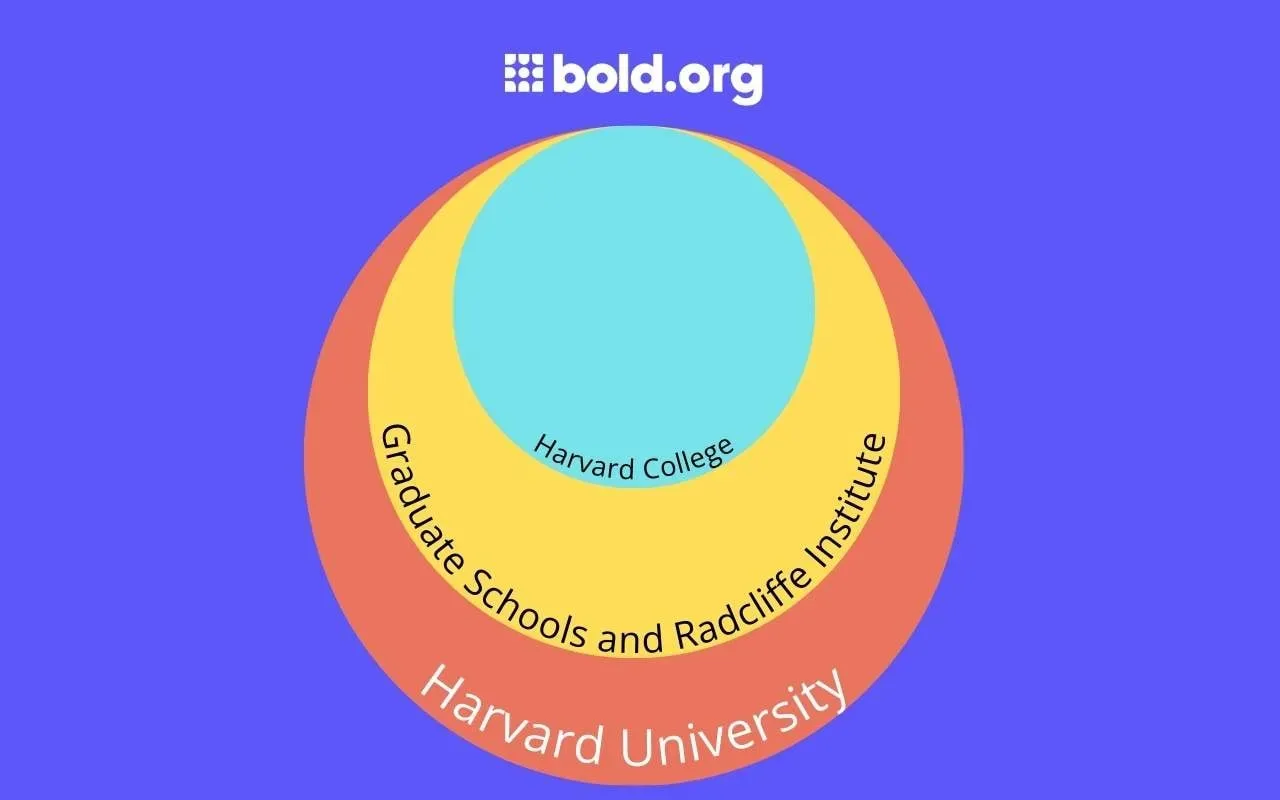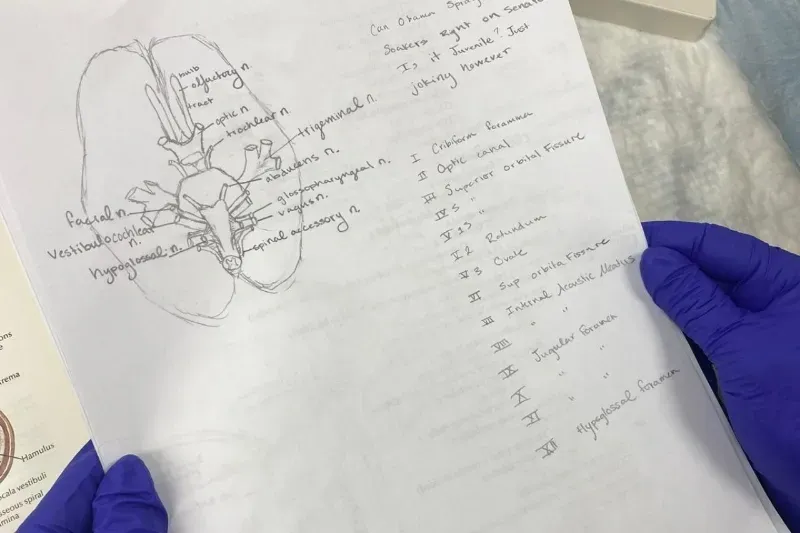Harvard College vs Harvard University


Access thousands of exclusive scholarships
for free
Wait! Is there a Harvard College and Harvard University? The simple answer is yes. The best way to explain this relationship is to understand that Harvard University is a mother with various children, and Harvard College is its youngest child. In this article, I'll delve into the mysteriousness of Harvard University to help you understand its academic world.
In other words, Harvard University, located in Cambridge, Massachusetts, is a private institution with an enormous campus of about 5,000 acres. Within that, you will find schools for undergraduates, graduates, and professionals. Harvard University includes 14 schools, each exerting a different function in the vitality of Harvard.
Don't wait too long! Apply for scholarships at bold.org and fund your education at Harvard College.
Harvard College vs Harvard University
Harvard University is a prestigious Ivy League institution in Cambridge, Massachusetts. Established in 1636, it is the oldest institution of higher education in the United States. Harvard University has 12 graduate schools, one school for advanced study (Radcliffe), and Harvard College, which represents all its undergraduate divisions and offers its students a rich liberal arts undergraduate studies curriculum.

Harvard College
Are you finally graduating from high school and have your educational dreams so sharp that you are ready to pursue Harvard? Your first step is to apply for Harvard College. Harvard College specifically refers to a tight-knit community of undergraduate students composed of about 7,000 students. Harvard students have the option to study disciplines such as social sciences, biological sciences, mathematics, computer and information sciences, history, physical sciences, engineering, psychology, visual and performing arts, and English language and literature.
Concentrations
Harvard College will allow you to pursue a double concentration, joint concentration, and special concentrations:
Double Concentration
Students curious about more than one area of study can dive deep into these fields at Harvard College. When students declare a double concentration, they can pursue two paths (e.g., mathematics and history). A double concentration can be a great opportunity for individuals who see connections between very distinct topics or are only interested in developing two types of intelligence (e.g., quantitative reasoning and verbal intelligence).
Joint Concentration
Contrary to double concentration, joint concentrations allow students to combine two fields of study, but the difference is that these two fields can be integrated into a coherent field of study. For instance, if you decide to study psychology and economics, you can combine these two fields to understand behavioral economics (consumer behavior).
Special Concentrations
Are you a visionary? Harvard allows students to craft their concentration. This means that students can design their academic path, enabling them to research an innovative topic or combine disciplines not covered by Harvard College's offerings. Students interested in special concentrations must submit a petition to the committee of special concentrations.
Wondering if Harvard offers scholarships? Learn about Harvard scholarship opportunities today.
Get Matched to Thousands of Scholarships
Create your Bold.org profile to access thousands of exclusive scholarships, available only on Bold.org.
Create Free ProfileHarvard College's Requirements
Although finding concentrations that align with your intellectual curiosity can seem challenging at first, don't worry. Harvard College students have a liberal arts curriculum that requires them to study general education, quantitative reasoning with data, distribution, expository writing, and foreign language.
General Education
Harvard College designed an educational curriculum in which students learn about topics that question various facets of society. Some of the topics Harvard College offers students in general education are divided into four categories:
- Aesthetics & Culture
- Ethics & Civics
- Histories, Societies, Individuals
- Science & Technology in Society

Quantitative Reasoning with Data
Harvard offers students courses in quantitative reasoning with data. This is required of all undergraduate students at Harvard College, and they have to take at least one class, but if requested by Harvard faculty, the class can be a pass/fail. The purpose of taking a course in quantitative reasoning with data is to encourage students to think critically about data in the real world by learning computational, mathematical, and statistical topics and techniques.
Distribution
Undergraduate students have the distribution requirement as part of their core curriculum. Students have to take a course in each of the three following divisions:
- Arts and Humanities
- Social Sciences
- Science and Engineering and Applied Sciences
Taking courses in these categories will allow students to identify which topics they are most interested in, which will help them choose what concentrations best suit their intellectual curiosity.

Expository Writing
Harvard College requires students to take a one-semester course focusing on writing proficiency and scholarly writing. The course is required during the first year of students, and students still need a minimum grade. Otherwise, they will take another semester in expository writing.
Language
Harvard College students must demonstrate proficiency in at least one language other than English. In case a student doesn't have proficiency in a language other than English, they must take eight credits-hours in a chosen language and fulfill all the requirements, such as earning a passing score on a placement examination.
Create Your Free Profile to Apply for Scholarships Today!Harvard House System
Harvard College is also comprised of a Harvard House System, where students are part of a House, just like Harry Potter belongs to Gryffindor in Hogwarts. Harvard College houses, like Hogwarts, also have their emblems, just like Gryffindor, Slytherin, Hufflepuff, and Ravenclaw. However, Harvard College has three times more than Hogwarts, a total of twelve:
- Adams House
- Cabot House
- Currier House
- Dunster House
- Eliot House
- Kirkland House
- Leverett House
- Lowell House
- Mather House
- Pforzheimer House
- Quincy House
- Winthrop House
Find your Harvard House and the scholarship to match! Visit our scholarship blog today.
Harvard University's Graduate Schools
Harvard University not only has a strong undergraduate college but also offers graduate and professional schools to students looking to hone their intellectual skills in a specific field. These are the graduate and professional schools at Harvard University:
Harvard School of Engineering and Applied Sciences (SEAS)
Harvard School of Engineering and Applied Sciences (SEAS) is also known as the John A. Paulson School of Engineering and Applied Sciences. Students at Engineering and Applied Sciences Harvard Graduate School analyze global issues through its interdisciplinary program in bioengineering and computer science.
Harvard Graduate School of Arts and Sciences (GSAS)
Are you interested in pursuing a graduate degree in Humanities, Social Sciences, or Natural Sciences at Harvard? The Kenneth C. Griffin Graduate School of Arts and Sciences, or GSAS, can be your next step in your educational endeavors. The School offers Ph.D. and Master's degrees in literature and astronomy.
Harvard Extension School
Harvard Extension School is dedicated to adult, part-time learners and offers open enrollment for online and on-campus courses. Harvard Extension School brings Harvard a diverse student body of CEOs, Government Officials, PhDs, and people in other stages of their careers.
Harvard Business School (HBS)
At Harvard Business School, students learn to analyze real-world business scenarios and develop critical thinking and decision-making skills. Harvard Business School offers students the possibility of pursuing three learning tracks: Certificate of Management Excellence, Corporate Director Certificate, and Digital Transformation Certificate.
Harvard School of Dental Medicine (HSDM)
HSDM is a school that offers students preparation for a dentistry career. The School provides advanced training and has an innovative curriculum that studies the connection between oral health and overall health.
Harvard Graduate School of Design (GSD)
GSD is renowned for its design education. The design Harvard Graduate School offers master's and doctoral programs in architecture, urban planning, urban design, and more. The School emphasizes design to address social, environmental, and cultural issues.

Harvard Divinity School (HDS)
Harvard Divinity School embraces a non-denominational approach to religion, in which students from diverse religious backgrounds can study religion, theology, and ethics. They offer a Master of Divinity and doctoral programs for students pursuing a more advanced scholarship.
Harvard Graduate School of Education (GSE)
Do you want to impact the world of education? GSE can be your next step in education. The School offers students various Master's and doctoral programs, and programs delve into areas such as curriculum development, educational policy, and educational leadership. After, students can make a significant impact in classrooms, districts, and educational organizations around the world.
Harvard Kennedy School (HKS)
HKS is a school that trains students in public policy and government topics. The School offers Master's, executive, and doctoral programs that equip them to solve complex challenges in the complexities of public service.
Harvard Law School (HLS)
Harvard Law School is a historical and traditional law school founded in 1817. Its curriculum includes more than 500 courses and seminars. Harvard Law School offers a Juris Doctor (JD) degree, preparing students for law and legal scholarship.

Harvard Medical School (HMS)
Harvard Medical School is a traditional medical school that has existed for more than 200 years. The School offers Master's, PhD, MD, and postgraduate programs. Graduates leave Harvard Medical School ready to become leading physicians, researchers, and healthcare leaders who will contribute to a better healthcare system.
Harvard School of Public Health (HSPH)
Harvard T.H. Chan School of Public Health (HSPH), also known as Harvard School of Public Health, is an institution dedicated to promoting health around the globe. The School trains students to be public health leaders to impact population health positively.
Harvard Radcliffe Institute
Harvard Radcliffe Institute is dedicated to advanced study, and its focus is on interdisciplinary exploration. Students, scholars, and practitioners work together to research topics that require knowledge from different disciplines.
Don't wait! Help secure your future at Harvard. Apply for scholarships at Bold.org now.
Frequently Asked Questions About Harvard University
How does the house system at Harvard College work? Do Harvard students have to choose the house?
In February, Harvard University organizes blocking groups randomly into the 12 houses. The randomized process helps all houses be diverse, meaning students cannot do anything to become part of a specific house.
Are students at Harvard College allowed to take classes at other Boston colleges?
Yes, Harvard College allows students to take classes at MIT. Students at Harvard College also have the option to take courses at many of the graduate schools at Harvard University.
What is the Harvard Yard?
The Harvard Yard is the oldest part of the Harvard campus. It is the location of many of the freshman dormitories, as well as many of the libraries, classrooms, Memorial Church, and the Harvard president and dean's office.
Fuel your future at Harvard. Explore scholarships at bold.org and unlock your path to success.

About Caio
Caio is a dedicated content writer and researcher with a strong focus on psychology, education, and social justice. He has extensive experience in topics such as work-study, financial aid, internships, and scholarships.
Caio holds a B.A. in Psychology from Columbia University in the City of New York. He has explored various topics, including educational bilingualism, social psychology, cognitive psychology, and neuroscience.
Experience
Caio's journey in writing and research began at LaGuardia Community College in 2019. He explored educational bilingualism in New York, analyzing how bilingualism is prioritized in specific areas and its impact on children's cognitive abilities compared to monolingual education. He also investigated social psychology topics, focusing on the discrimination faced by African Americans, from microaggressions to mass incarceration, and the resulting mental health issues such as PTSD, depression, and anxiety.
After transferring to Columbia University in 2021, Caio further honed his writing and research skills. His work included examining the portrayal of Latinos as criminals in Hollywood and the societal biases this image perpetuates. He also researched cognitive psychology topics, such as the effects of work-life balance on mental health and the interplay between work identity and life identity. Additionally, Caio participated in neuroscience research, assisting with MRI studies to understand spatial behavioral navigation, the hippocampus's role in memory and orientation, and evaluating treatments for Ideomotor Apraxia.
Since joining the Bold.org team in 2024, Caio has leveraged his extensive background to help students navigate their educational journeys. His personal experiences as an immigrant navigating the U.S. educational system, from paying student loans to winning scholarships, and his work with a nonprofit supporting low-income adults in pursuing higher education have fueled his passion for education and social equity.
Caio is driven by his desire to make a meaningful impact. Through his creative and engaging writing, he addresses relevant issues with the powerful art of storytelling. He aims to provide valuable insights and resources to students, helping them understand the nuances of college life and the support available to them.
Quote from Caio
"The purpose of education is to replace an empty mind with an open one." -Malcolm S. Forbes
"My interpretation of this quote is that our minds can be fulfilled by 'empty' ideas, which means that we are not looking for further sources to fulfill our minds but those in our comfort zone. However, when we educate ourselves, we dive into a world of complexities beyond our imagination. It is like taking a trip to a very different country. We become members of a continuous legacy created by beings like us in which we have developed our ability to use a wonderful human tool: language. Sharing educated theories through language is how humans can easily contribute to one another's successes. Why not be open to education?"
